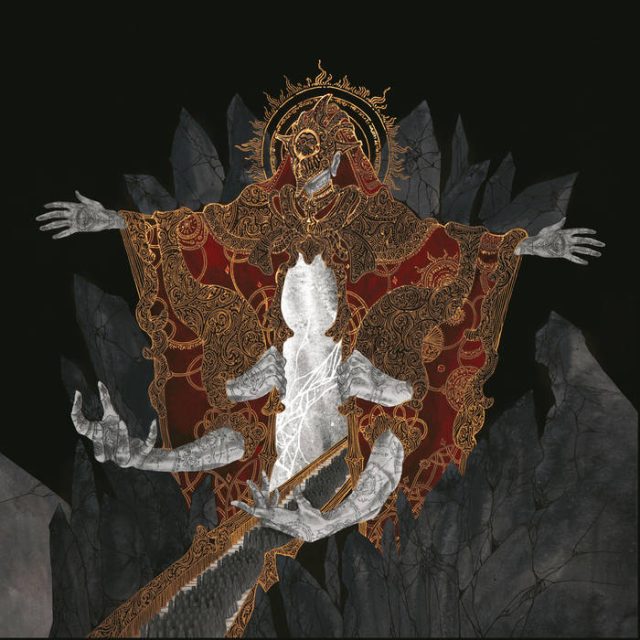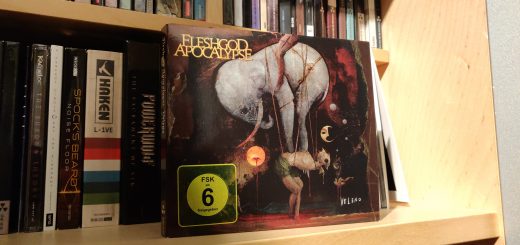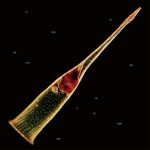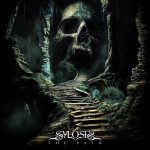Dvne: ‘Voidkind’ Review

The album artwork for Voidkind
From the barren wastelands of Arrakis – or perhaps just Edinburgh – emerges yet another record by progressive metal band Dvne. Voidkind, their third record all in all, sets out to build upon the momentum gathered by 2021’s Etemen Ænka, a record which grabbed the attention of the post-Mastodon sludge scene in a way that very few bands have managed. I, as a humble obsessive of the prehistoric elephant band, would posit that the majority of modern sludge bands have a little bit of Mastodon in them, but this avoids the classic pitfalls and lands as something nowhere near derivative – and not just because they’re inspired by sandworms instead of whales. Listen al gaib, reader, for Dvne is about to take you on a very different kind of voyage.
Opening salvo Summa Blasphemia brings with it an immediancy to its intensity – vocals flitter between harsh and clean in effortless fashion and riffs carve their way through your skull as though it’s hollow. The drumming is hypnotic. A great deal fits into a meager five minutes. But it’s Eleonora that really impresses, with its rhythmic flourish and dynamic peaks and valleys, culminating in a titanic climax that completely floors. Layered vocals from Victor Vicart and Dan Barter (the former of which having improved considerably in the clean vocal department) are assisted by an industrial scale riff land like a ton of bricks. Some albums would have ended with this, but this is only Song 2 – or “woo hoo”, as some described it in the 90s.
Some more straightforward songs are paired with the more intricate pieces – Sarmatæ is something of a palette cleanser, abandoning the more ambitious song structures Dvne usually leans into, in favour of a moment to Just Do Riffs. And those riffs land remarkably well throughout the record, with Vicart, Barter and Allan Paterson all beefing up the guitars considerably, Vicart apparently with a unique nine-string setup on some tracks. Newcomer synthesiser wizard Maxime Keller makes their mark with some subtle atmospheric work throughout, best showcased by Plērōma and its heavy synth layering underneath Vicart’s soothing clean vocals – this track is Dvne at their most psychedelic and the synth makes for a wonderful inclusion, really adding to the dark sci-fi undertones the band’s aesthetic yearns to evoke.
Another high point: the drumming. Dudley Tait throws in the occasional flashy fill here and there but serves the songs incredibly well, and has managed to find a drum sound that perfectly matches the production. The guitars, too, carry themselves prominently within the mix without throwing off the balance too much, and the vocals sit well above them without feeling like they’re in any way compromising the intricate instrumentation behind them. As a whole, Voidkind’s production choices embolden the compositions to the point that I’m now coining it as “Arrakis Angus” – one hundred percent beef.
Reliquary displays some excellent lead guitar work before throwing us right into what this album does best – tension and release. The to and fro, the push and pull of it all is just sublime. With one exception: Abode of the Perfect Soul is a near-perfect song really pushes the boat out here, with a section towards the middle of the track that just riffs and riffs and riffs before taking a step into more subtle territory, only to rise up again and eat you for breakfast – all before ending with a whimper, not a bang, through the use of a fadeout. While I’m not always bothered by fadeouts, this irked me – let that final riff stew, I say. Though, the underlying tension does come to a head with final track Cobalt Sun Necropolis: Vicart’s clean vocals soaring before a cavalcade of riffs meander towards yet another epic climax, culminating with some pretty ominous noises and the feeling that you’ve just been sucked into the nearest black hole. A very ominous ending indeed.
With Voidkind, we see Dvne put out a record generally consistent in quality with its excellent predecessor Etemen Ænka. It’s not much of an evolution, nor does it particularly need to be, the band having developed their own relatively distinct sound already and iterating upon it somewhat with this here release. And despite the one or two areas of disappointment (I’m not bitter about that one fadeout, but…), Voidkind is still a highly competent record that firmly places itself in the upper echelon of sludge metal. The instrumentation is sublime, the production choices enhance the experience further and most fundamentally of all: the journey this album carries its listeners on makes for an immensely rewarding listen.









